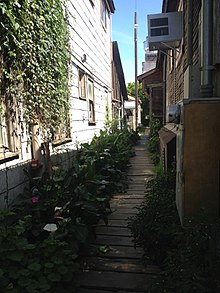Locke, California
After a fire destroyed the Chinatown of nearby Walnut Grove in 1915, many Chinese immigrants from the town resettled in and further developed Locke.
[4] The delta swampland on which Locke was built on was home to Native American Miwok and Maidu tribes for hundreds of years.
Legislation such as the Swampland Reclamation Act of 1861 was enacted in California to put perceived empty and wasted lands to use and stabilization.
They built hundreds of miles of levees in waist deep water where malaria still rampaged, reclaiming a total 88,000 acres (36,000 ha).
[6] In 1912, three Chinese merchants, two from the nearby town of Vorden and one from Walnut Grove, contracted tradesmen to construct three buildings.
Though some merchants hoped to provide a destination for riverboat and train passengers, the idea never worked due to the discrimination against Chinese during those times.
As the town grew, so did its reputation as a destination for illicit entertainment, gaining the nickname "California's Monte Carlo".
Chinese immigrants in Locke started patterns in California agriculture that are continued today in the Sacramento-San Joaquin region, including contracted labor, tenant farming, sharecropping, and the piece wage system.
[6] Baptist missionary Dr. Charles Shepherd would bring in his Chungmei home boys for the pear harvest at the end of July.
[1] A Hong Kong-based developer purchased the town in 1977 from the Locke Heirs and sold it in 2002 to the Sacramento Housing and Redevelopment Agency.
At the north end of Main Street, the restored Locke Boarding House museum (now owned by California State Parks) operates daily, staffed by volunteers.
On July 3, 2016, a fire erupted on the second floor of the Locke Country Store on Main Street, which contained two apartments.



